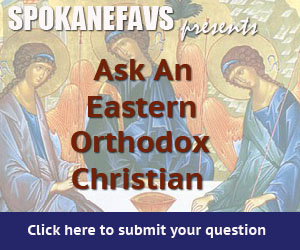What would you like to know about the Eastern Orthodox Christian faith? Submit your question.
What is the history of the Greek Orthodox Church here in Spokane?

The devotion to the Greek Orthodox faith led to the erection of the Parish Hall in 1932 (Holy Trinity Greek Orthodox Church) and for many years, this building served an all-purpose function of chapel and community center. Five or six times a year a priest would be invited to perform the Divine Liturgy for the faithful.
Our parish was founded mostly by Greek immigrants as a Greek Orthodox Church on March 28, 1948 when the cornerstone for the main church building was laid, and construction of the church building began, patterned after the Byzantine architecture of the church in Constantinople “Hagia Sophia” (Holy Wisdom).
Geographically speaking, we were the only Orthodox Church for hundreds of miles in all directions. The result was that the years passed, people of other ethnic Orthodox backgrounds joined the church and became part of the community.
We were blessed with a beautiful mix of people of many Orthodox backgrounds — Armenians, Russians, Ukrainians, Serbians, Romanians, Ethiopians, Bulgarians and Western Europeans.
In most recent years, the growth of our parish continued with the wave of converts searching for, discovering, and becoming a part of this original ancient Christian faith and community life.
We, the children and grandchildren of the pioneers, have now taken on the responsibility of our parents and grandparents. As inheritors of their values and beneficiaries of their hard work, we now have an obligation to fulfill — that of passing on to this generation the priceless heritage we received. We can show no better honor to them than to follow their example of faith, determination, and love of God.
The Greek Festival

Historically it was in 1935 that the annual Greek dinner festival was born. To get ready for this big event, the women would prepare food for weeks, come before daybreak to prepare the food on festival days, and go home and return in the afternoon all dressed up ready to serve meals.
It is doubtful that some years the dinner/festival could not have continued without the willingness of these non-Greek immigrants and converts to have rolled up their sleeves and become a part of our festival and community.
For more than 40 years, the annual dinner was just that — a dinner served downstairs and festival items and pastries sold upstairs. The entire event took place indoors.
However, by the late 70s, changes were made to the dinner if it was to continue to serve the needs of our Spokane guests. During “the old days,” patrons routinely would check their coats and sit down to leisurely dinner, whereas the customer of the 70’s had little time to wait. They wanted their dinner to go. If the dinner got cold on the way home no problem, it could be zapped in the microwave.
This demand led to the “take out” stand. In 1979, parishioners provided a service stand that was used to distribute dinners to go. At the same time, the parish council reasoned that a tent that served mezethakia and loukomathia and beer and wine should be set up next to the take-out stand. Greek dancers performed outside for the very first time displayed the ethnic dances of Greek culture.
At today’s festivals as we sit outdoors and hear the infectious Greek music, smell the aroma of grilled souvlakia, watch her children dance, enjoy a glass of wine, and eat lucomathes, it is difficult to remember the time when this was not so. The festival is held every year during the last weekend of September.
History and future
It is impossible to read about our past 80 plus years and not feel the sense of family that permeated our Orthodox community. Like a tapestry, our lives were intertwined, we laughed together and cried together and shared our troubles and joys. There was a sense of belonging, a part of, that we all felt.
It seems apparent that we Orthodox cannot have real friendship with God or community without real community. This is why we savor that real sense of belonging. By contrast, anyone wishing to become less ethnic is being shortsighted. They would do well to adopt a greater “ethnic style” of practical village social community life if they wish to survive and grow.
The person you bake bread with year after year for the churches Food Festival will pray for your soul when you die, something that is typically foreign in western Christianity. The church sponsors, moreover, he or she will look after the spiritual and physical welfare of your children and your children’s children.
Human communities are not built on grand theories about the “brotherhood of man” but by women who bake the bread together, the men who roast the lamb, the raffle ticket that is sold, or the church property that is cleaned day in and day out, decade after decade.
From the acts of the apostles to our present day, we see the Christian community is not an idea; it is a practical reality or nothing at all. The Christian community involves the whole person, not just some “spiritual” part. It is often said that “If I haven’t been to your home, and you haven’t been to mine, how can we call this community?”
These treasures of an Orthodox village-church-community have been preserved intact for 2000 years. May we continue to build upon the foundation that has been set forth for us.








